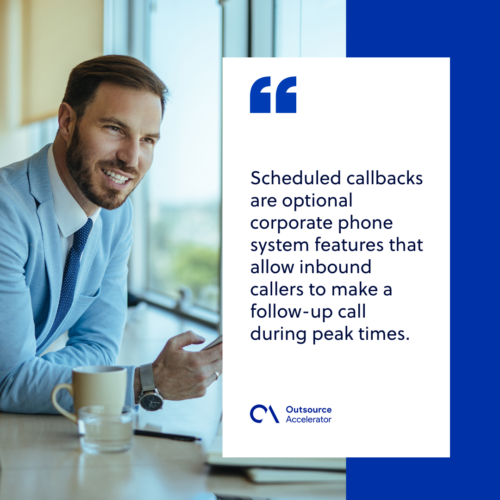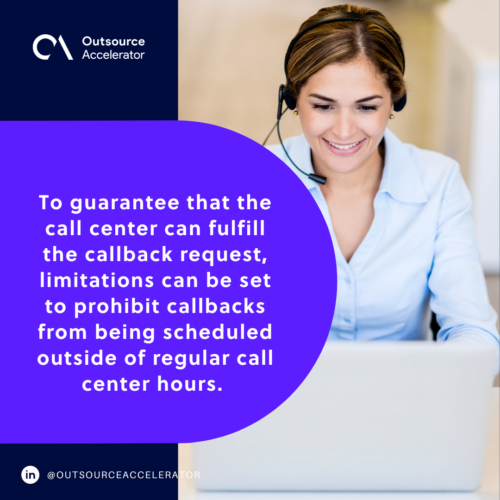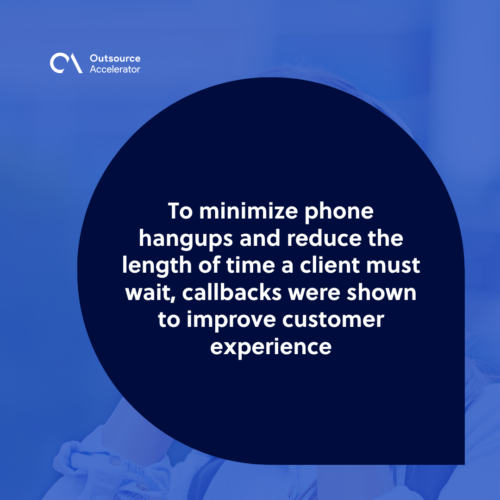Scheduled callback
Definition
What is a scheduled callback?
Scheduled callbacks are optional corporate phone system features that allow inbound callers to make a follow-up call during peak times.
The caller can request a callback and specify a convenient time for the callback to take place if they don’t want to wait on hold for a long period.

How does a scheduled callback work?
The caller is given the option of when the call will be answered using the scheduled callbacks.
To guarantee that the call center can fulfill the callback request, limitations can be set to prohibit callbacks from being scheduled outside of regular call center hours.
A scheduled callback can also be controlled to off-peak periods to help boost off spikes in call volume. Incoming callers can select a time that works ideal for them from a list of possible times.
Then, a callback will be placed in an outgoing queue or assigned to an employee through a reminder message that contains the customer’s details and the reason for the requested call.
Through the use of an Erlang C Calculator, users can calculate how many call center agents are required to answer the phones to meet the projected volumes.

Benefits of scheduled callbacks
Here are some benefits of scheduled callbacks:
Improved customer experience
To minimize phone hangups and reduce the length of time a client must wait, callbacks were shown to improve customer experience. Scheduled callbacks increase customer satisfaction by providing clients with a sense of control of their own user experience.
By providing a time slot of the client’s choice, agents may be more certain that the consumer is accessible and expecting a call, increasing the chance of a one-call resolution.
Enhanced agent performance
When an agent receives a callback request from a client, they will be able to see all of the caller’s information on his or her screen. They only need to click one button to interact with the consumer.
This procedure saves agents a substantial amount of time and effort, resulting in an enhanced productivity rate.
Reduced call handling times
Customers that choose scheduled call-back service are often approachable since they do not have to wait on hold. In addition, if a callback request is received, the most suitable agent can contact the client.
It makes the interaction even more delightful. Both of these factors result in a shorter handle time while also increasing agent morale and efficiency.

Why should call centers use callbacks?
Callbacks from call centers may be extremely beneficial to both businesses and customers. So instead of making consumers wait in line, provide a call-back service.
Callbacks
can reduce abandonment rates, quicker processing times, and greater first-contact resolution rates.
So, here are the reasons why call centers should be using callbacks in their system:
Improves first contact resolution (FCR)
For both efficiency and customer satisfaction, it is important to have FCR as a call center metric for assessment. If an inquiry can be addressed with a single phone call or interaction, it is more efficient in terms of agent time.
It is also likely to result in greater caller satisfaction, as multiple contacts are highly inconvenient for customers. It can reduce inbound call volumes and free up additional resources if their concerns can be resolved ahead of time.
Reduces abandon rate
Call queuing is made harder when customers don’t know how long we’ll have to wait or where they’ll take place.
Further, if your company has seasonal peaks or volume fluctuations, you may find yourself with extra agent capacity at times. Call blending can help with this, although callbacks are another alternative.
Boost customer satisfaction and agent’s productivity.
Removing the inconvenience of long hold times by allowing callers to request call-back results to more satisfied customers.
As a result, agents are less stressed since they have fewer issues to deal with throughout their working day. This has a favorable effect on employee morale and productivity.
There’s also evidence that having nicer callers results in a quicker average handling time, which increases both customer satisfaction and productivity.
Improves brand reputation
Poor customer service is no longer acknowledged, and brand loyalty is becoming increasingly difficult to achieve. Customers have more options now that they have instant access to the internet in their pockets.
Also, the growth of social media has given them a larger voice and a place to express their complaints. A scheduled callback system is set to give a good impression to customers and can improve brand reputation.







 Independent
Independent




